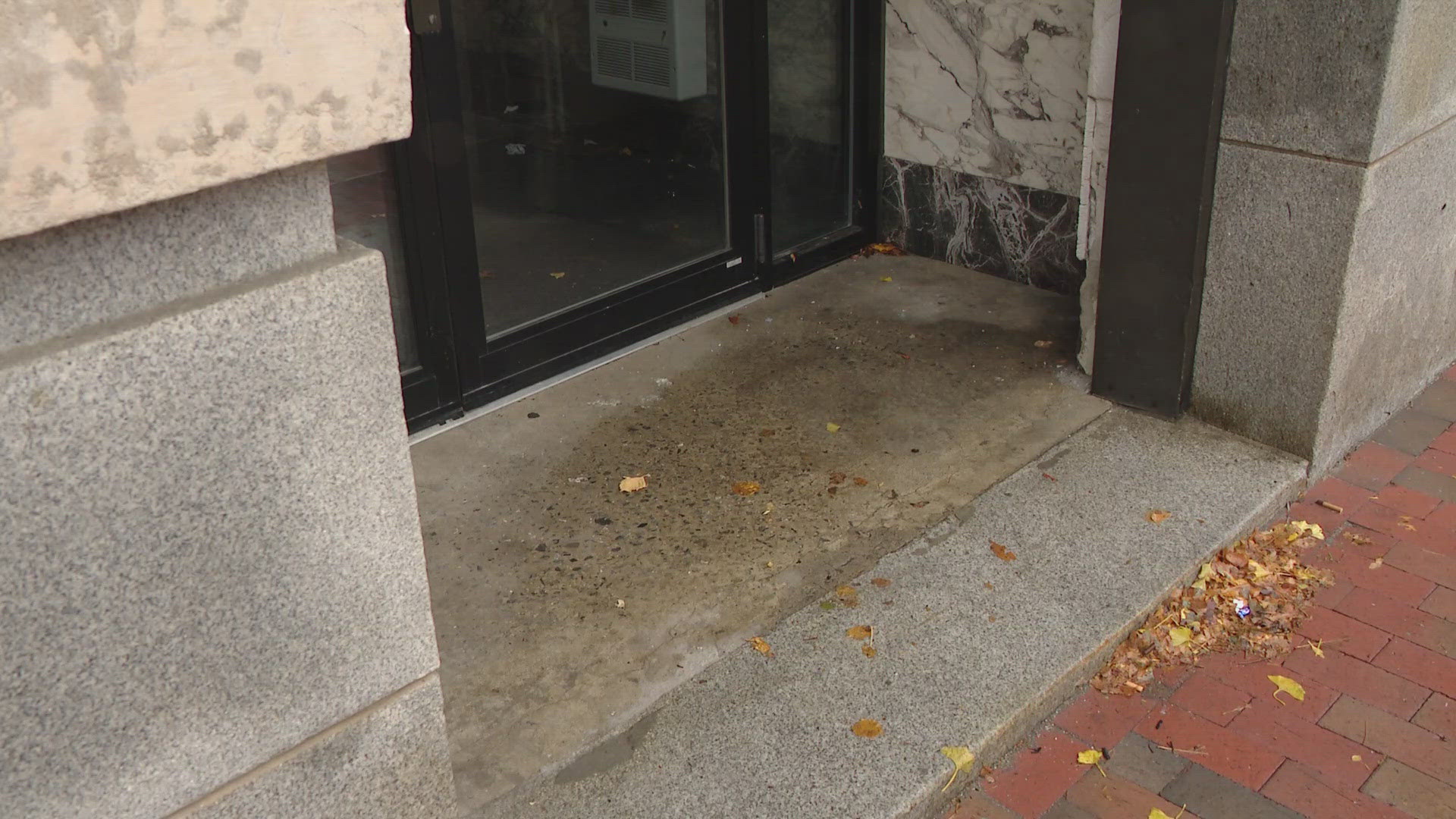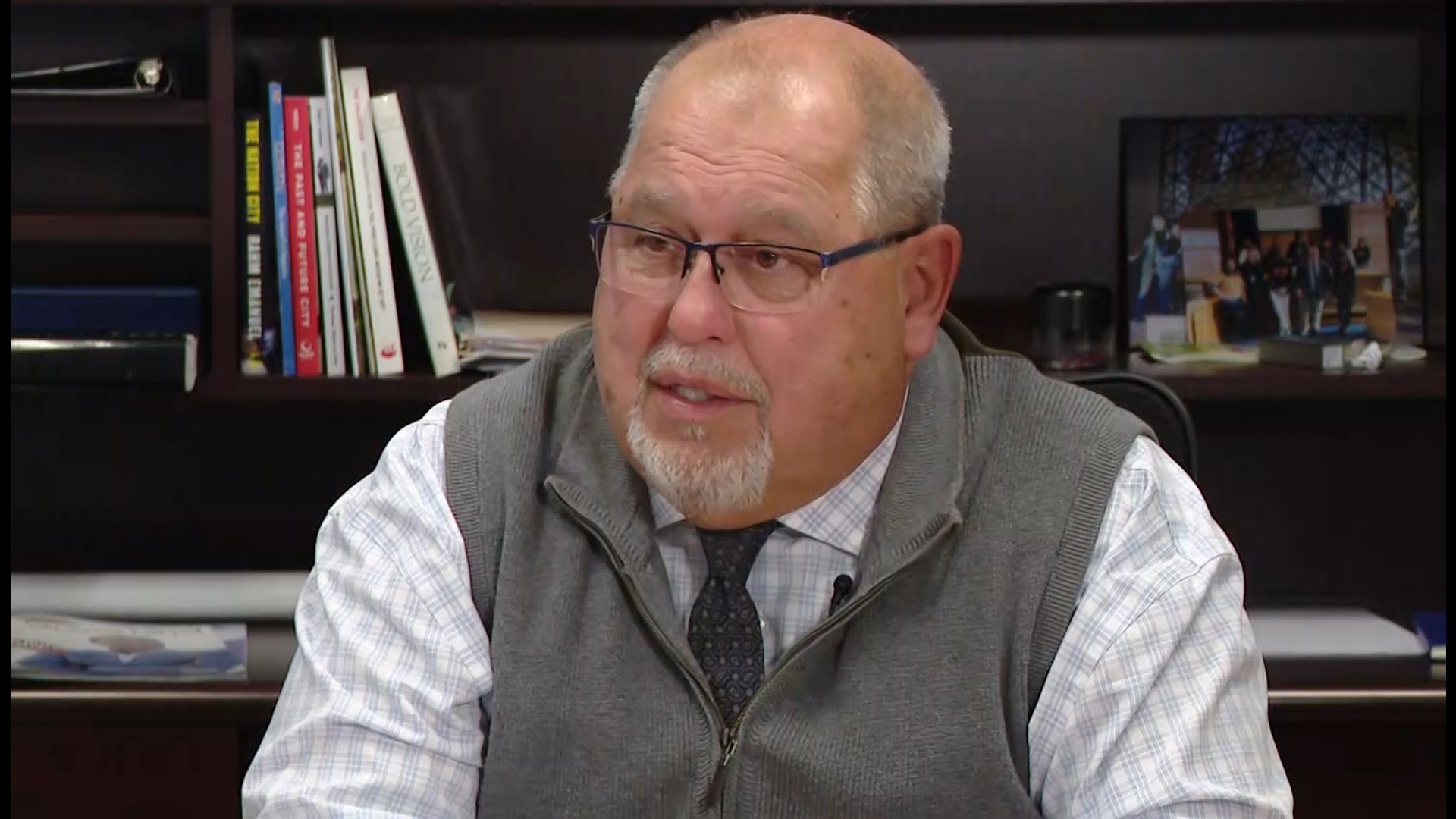PORTLAND, Maine — Despite the City of Portland making a continuous effort to address homelessness and its impacts on the community, employees at CORE commercial real estate firm explained that they and small business owners that they lease to feel the brunt of the issue on a daily basis.
On Tuesday, while completing a routine check on a property at 465 Congress St., CORE property manager Andrew Orkin said he saw human feces scattered in the doorway of the building.
"There were three different instances of feces," he said. "It looked like someone just pressed themselves up against the glass windows and just let it go there. There was fecal matter on the ground and all over the place. It was foul. You could smell it."
Orkin said right after seeing the feces, he walked straight to Portland City Hall, requesting to speak to anyone who could do something to address the issue.
On Congress Street in downtown Portland, Orkin and his colleague Dajana Derman said there are often more people taking shelter under doorways than you can keep count of.
"If you walk downtown Portland now, all you smell is urine and all you see is people passed out," Derman said.
She explained seeing needles, urine, feces, and vomit are regular sights in the area. Because many unhoused people take cover in front of business spaces, business owners and employees are constantly tasked with cleaning up bodily fluids that they leave behind.
Orkin said despite the many complaints they have made, the city's public works department's response has been the same.
In a text message, the city's communications director Jess Grondin shared that doorways of businesses are considered private property, making it their job to clean it up.
"While the city does maintain sidewalks, we do not maintain vestibule areas," Grondin wrote.
Orkin said he understands that vestibules are private property, but he explained homelessness is a public issue.
"You shouldn't have to put in your job description must be ok with fecal matter needles and urine," Orkin said.
He said CORE leases and manages several commercial real estate properties to businesses in the city. He said people of the unhoused community leaving behind bodily waste and loitering in areas has caused an interruption to business owners who lease space from them, sometimes even causing them to leave.
One tenant that leased a space above Portland Pie Company left their storefront because of the constant issues.
Derman said she emailed the city's mayor Mark Dion about ongoing issues in June.
"I was not satisfied," she said. "There was nothing in the email that said, 'Hey, this is the plan,' You know?"
Derman said in the email, Dion pointed out that $25 million was used to build a shelter and thousands of dollars has been spent to help better address the issue.
"In my mind, when they say that we built a $25 million shelter, I would ask them, 'Do you really think that shelters are the solution? Is there a bigger problem here?'" Derman said. "Is there something that people are experiencing mentally? I think that we as a society need to find a better solution than just, 'we built a $25 million shelter.'"
Dion said he hears the community's concerns, saying that he believes it's the city's responsibility to find reasonable solutions, and to find them quickly.
"We hire a private vendor that comes in and removes graffiti from buildings," Dion said. "So, I am exploring the possibility that we could use a similar model to address the consequences of unhoused taking camps on someone's property and what results from that, but I have to convince an entire city council to do that as well."
He said he proposed a resolution to reduce the syringe exchange ratio to 1:1 in hopes that if would address community safety concerns. That proposal, he said, was shot down by city council.
Dion said he has been working with several agencies to figure out the best way to intervene, acknowledging that it does disrupt the community and negatively impact businesses when syringes, bodily fluids, and fecal matter are left behind by people of the unhoused community.
He said some people may view some of his suggestions or the ideas that he supports as too radical.
"At the center of these ideas is the idea of an unhoused person being afforded the opportunity to make their own decisions about when and where they will seek help," he said. "I don't support that. My sense is the very nature of their disease prohibits them from making a judgement in their best interest. So, we need to intervene."
Dion said he believes people often assume his tough approach to addressing homelessness is perceived as an attempt to criminalize homelessness. He refuted the idea, and said that's simply not the case.
"I think to certain individuals or groups, I am criminalizing homelessness," Dion said. "It's not a crime to be unhoused. Let me be very clear about that. But it is a crime to engage in certain behaviors, and if left unchecked, we implicitly give permission for more of those behaviors to occur."
Getting others to take more immediate action has been a challenge for Dion.
"I think we're well beyond commissions, more studies, and extended conversations. We have to act," Dion said. "If we have to modify strategy in the process then that's fine, but I think the public expects us to do something."
Dion said he believes as mayor, he thinks it's his responsibility to take immediate action, characterizing the current handling and response to the issue of homelessness as a "slow motion suicide."


